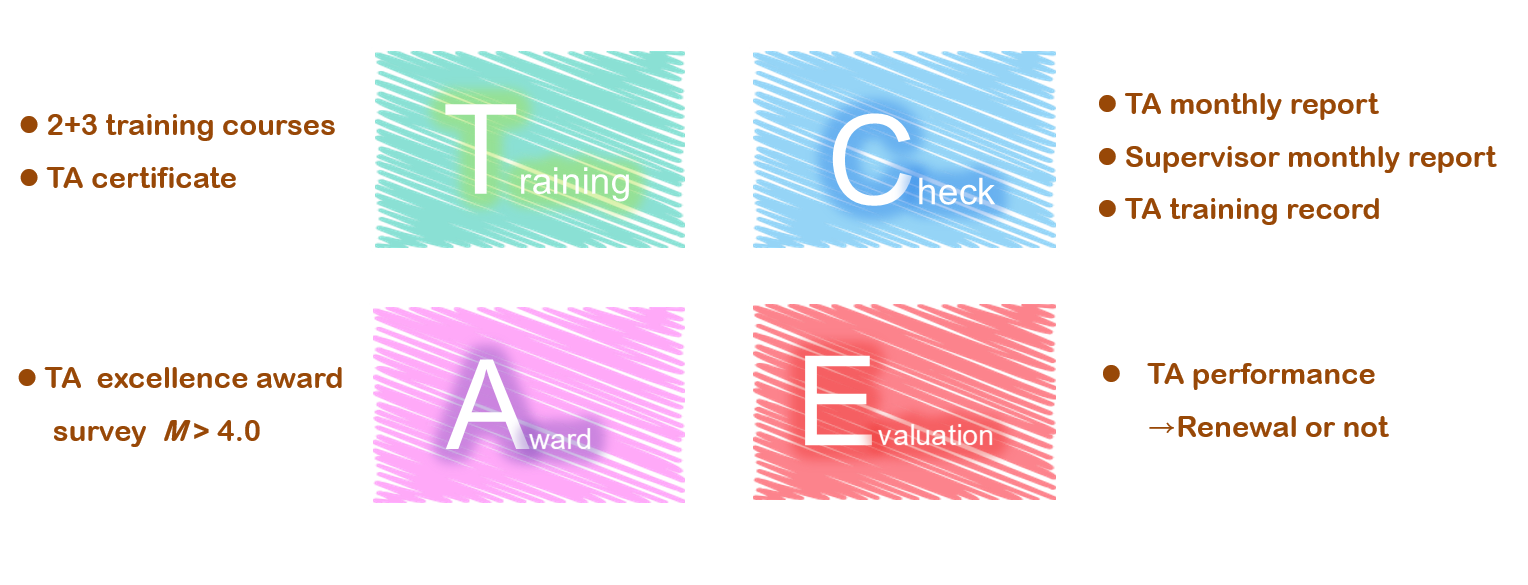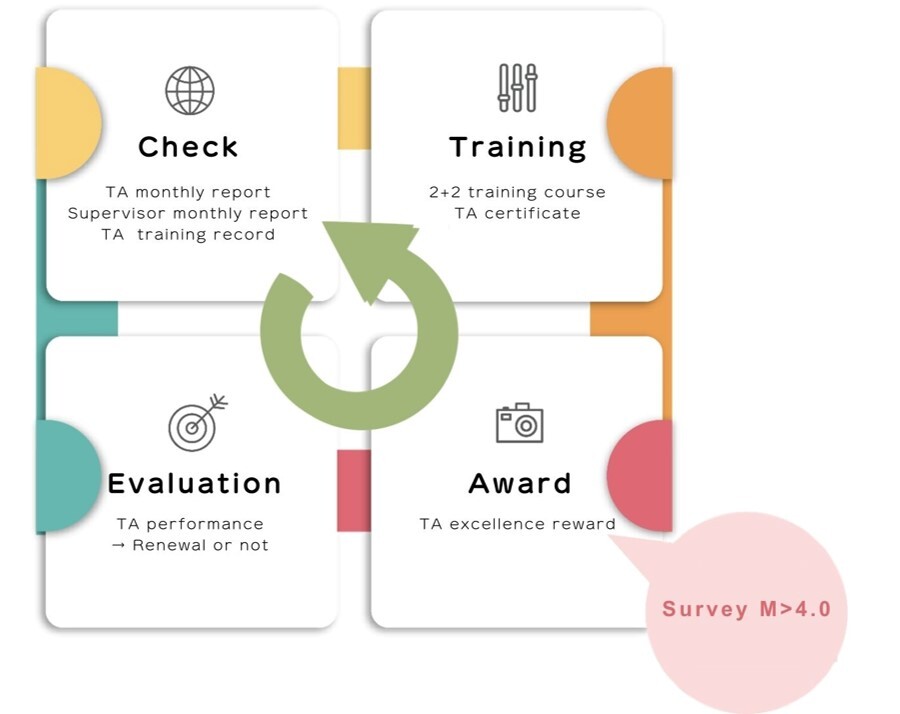Teaching and Learning Division
Center for Teaching Excellence - Teaching and Learning Division: A Great Helper for Faculty
The Center for Teaching Excellence is dedicated to enhancing the quality of teaching and improving student learning outcomes, with the ultimate goal of achieving excellence in education. The center strives to help faculty not only focus on their professional research but also value and learn effective teaching methods. At the same time, it equips students in this era of rapidly expanding knowledge and new technologies with learning skills and lifelong learning capabilities to enhance their competitiveness.
The Teaching and Learning Division primarily serves faculty members, focusing on inspiring their motivation and potential for teaching enhancement. It aims to help faculty understand that teaching is not merely a one-way transfer of knowledge but a process of fostering learning. This effort involves guiding faculty toward developing a "student-centered" learning model and understanding both students and the essence of the learning process. The belief that "excellent teaching can be learned" drives this division’s mission.
To provide robust teaching support and address various teaching-related challenges, the center offers a range of services:
- A comprehensive online teaching resource platform
- Teaching consultation services to address teaching challenges
- A mentorship program where experienced faculty guide their peers
- The establishment of themed faculty teaching development communities
- A variety of professional workshops and lectures for faculty
- Training programs for teaching assistants
These initiatives aim to improve teaching effectiveness and foster students’ learning capabilities.
Introduction to Program Projects
►TA Course ►Three-Creativity Curriculum ►Teacher Community
►Student Self-Directed Learning Communitie ►"Empowering Self-Directed Learning" Incentive Program
►Early Warning Student Counseling Program
Learning Through Action: The Role and Hidden Curriculum of TAs
John Dewey’s concept of “learning by doing” and the philosophy of “service-learning” illustrate that education and learning transcend age and are not confined to the classroom. Serving as a teaching assistant (TA) not only offers direct financial benefits but also provides the added value of the hidden curriculum. The hidden curriculum is characterized by its implicit and unintended nature. According to educational scholar Chen Bo-Zhang, it refers to “the unplanned or unintended knowledge, values, norms, or attitudes that students acquire in their learning environments, including material, social, and cultural systems.” Similarly, Wu Qing-Shan and Lin Tian-You note that “in school and classroom activities, some unplanned or undesigned experiences and activities subtly influence the achievement of students’ learning objectives.”
For TAs working within schools and classrooms, the hidden curriculum offers opportunities not only for their own unintentional learning but also for influencing the learning of others. On a university campus, the presence of learning is ubiquitous. By assisting faculty with teaching tasks, TAs gain access to hidden learning opportunities beyond their professional knowledge. This kind of learning and education is essential and integral to their role. The TA system envisioned by our university seeks to make TAs more than just aides to faculty. One of its primary goals is to foster potential hidden learning through the process of assisting in curriculum development or teaching activities.
Additionally, through the establishment and management of a TA community, a learning-oriented organizational model emerges. This model treats the learning process as rooted in experiential and social interaction. TA work primarily focuses on interpersonal interactions within the framework of a course, forming a core part of their learning environment. The interaction and exchange facilitated by a TA community further enhance the quantity and quality of learning, showcasing one of the university’s multifaceted values: the creation of learning communities.
A university’s primary function extends beyond the transmission of knowledge. It is a place where individuals—professors and students alike—engage in the development of knowledge within a complex and dynamic network of systems and communities. In this ecosystem, all members contribute to and benefit from mutual learning and growth.
Through the process of serving as a TA, individuals learn by doing, which not only supports their basic living needs but also cultivates skills for future academic or professional pursuits. These non-specialized aspects of learning gradually shape the personal learning styles of TAs and help them establish a sense of self-worth.


Web Links
Course Emrollment Website:https://sys.ndhu.edu.tw/SA/XSL_ApplyRWD/ActApply.aspx?lang=en
TA certificate Application:https://ndhucte.ndhu.edu.tw/p/423-1008-2370.php (After logging in, please search for “Center for Teaching Excellence” for activities.)
File Download
Application_Manual_for_Teaching_Assistant_(TA)_Excellence_Award_112-2
Center Contacts
Mr. YOU
Tel: 03-8906589
E-mail: hyttepd@gms.ndhu.edu.tw
Objectives of the Three-Creativity Curriculum
The purpose of implementing the Three-Creativity Curriculum is to encourage faculty to adopt teaching concepts that emphasize creativity (conceptual design), innovation (thematic uniqueness), and creation (practical application). By leveraging the unique cultural and natural environment of the eastern region and integrating it with the university’s curriculum and departmental expertise, the program aims to engage students actively in participatory and experiential learning. Through the process of identifying and solving real-world problems, students gain practical experience in cultural awareness and contribute to the well-being of local communities.
Categories of Three-Creativity Curriculum Subsidies
The subsidy program is divided into two categories:
- Category A: Single-course teaching innovation
- Category B: Cross-disciplinary teaching innovation
Faculty members can choose one category for curriculum development. The initiative encourages diverse teaching methods that integrate local characteristics and cultural elements, motivating students to actively participate in experiential and practical activities. The program aims to produce tangible outcomes, such as reports and projects, that contribute to the enhancement of local industries and establish a distinctive Dong Hwa University brand.
Expected Benefits of the Three-Creativity Curriculum
As a comprehensive university emphasizing research and innovative teaching, the diverse academic ecosystem at Dong Hwa University is enriched by the variety of its colleges and departments. By leveraging the features of teaching innovation, the program seeks to develop interdisciplinary, locally relevant, and industry-linked academic programs. These efforts aim to broaden students' perspectives, enhance their knowledge and skills across different fields, and boost their motivation for learning.
Center Contacts
Mrs. GUO
Tel: 03-8906591
E-mail: imyeee@gms.ndhu.edu.tw
To encourage faculty members at our university to form teaching and professional development communities, this initiative promotes innovative teaching, project-based research, and locally grounded teaching strategies. It also supports faculty in completing applications for grants such as the Ministry of Education’s Teaching Practice Research Program or the Ministry of Science and Technology projects. The goal is to establish a sustainable mechanism for professional teaching development, enhance teaching effectiveness, foster personal growth, and create distinctive faculty development communities at Dong Hwa University.
The Faculty Teaching Development Community Program (hereafter referred to as “the Program”) requires each community to consist of at least three full-time faculty members. Faculty members may come from any college or department within the university and must appoint one full-time faculty member as the convener. Each faculty member may join up to three communities but can only serve as the convener for one community.
The Program defines two types of faculty communities:
- Type A: Proposal Writing Communities, focusing on applications such as the Ministry of Education’s Teaching Practice Research Program or the Ministry of Science and Technology projects.
- Type B: Teaching Research Communities, focusing on innovative teaching, project-based research (including academic paper research and implementation), and local engagement practices.
The Program provides funding for community-related activities, with Type A communities eligible for up to NT$50,000 per group and Type B communities eligible for up to NT$30,000 per group. Priority is given to communities that engage in interdisciplinary, inter-institutional, or cross-sector collaborations, as well as those tied to the Teaching Practice Research Program or Ministry of Science and Technology projects. The subsidy amount will be determined based on the content and anticipated outcomes outlined in the proposal and will be formally notified after approval.
Center Contacts
Mr. ZHENG
Tel: 03-8906590
E-mail: bighead7361@gms.ndhu.edu.tw
Student Self-Directed Learning Communitie
The Student Self-Directed Learning Communities initiative aims to cultivate a culture of independent learning, enhance students' motivation, and encourage the formation of self-directed learning groups to engage in autonomous learning activities. During these activities, students are expected to apply, improve, or supplement their knowledge, think critically about how to achieve their goals, and collaborate with peers to execute various learning tasks. Through the process of “learning by doing,” students are guided to realize their dreams, deepen interdisciplinary thinking skills, and develop communication, coordination, and leadership abilities.
This program offers four application categories, with each community eligible to apply under only one category:
-
Academic Enhancement:
Groups form study teams to focus on activities such as preparing for further education, language learning, career preparation, academic coursework, obtaining certifications, conducting field visits, or participating in external seminars. The emphasis is on planning and executing activities tailored to the students’ learning needs. -
Service-Learning:
This category combines “service” with “learning,” encouraging students to plan community service activities and reflect on the process. By applying classroom knowledge to benefit the community, students gain inspiration and insights, learning knowledge and skills beyond the classroom through service-oriented and learning-related activities that follow the “learning by doing” approach. -
Project Implementation:
This category integrates departmental project courses, such as capstone projects or summative assessment courses, to support students in implementing project plans as part of their academic coursework. -
Innovation and Entrepreneurship:
Students use their knowledge to create practical products or platforms and engage in micro-entrepreneurship activities. Each team member in this category must participate in at least one entrepreneurship course offered by the university’s Innovation and Incubation Center.
Center Contacts
Mrs. LI
Tel: 03-8906587
E-mail: jeannie@gms.ndhu.edu.tw
"Empowering Self-Directed Learning" Incentive Program
To enhance students' professional and teaching competencies, this program is designed to improve learning abilities through individualized guidance and participation in teacher-facilitated learning and training. The "Empowering Self-Directed Learning" Incentive Program has been established to achieve these goals.
Students can apply for this incentive program by proactively consulting with a faculty member or through opportunities offered by faculty, followed by discussions and submission of an application to the Center for Teaching Excellence. The application must clearly outline the student's learning objectives and the teacher's guidance methods. Each student may only apply for one learning incentive, and for each course (combined sections count as one course), one student may apply per group of 25 participants.
Center Contacts
Mr. ZHENG
Tel: 03-8906590
E-mail: bighead7361@gms.ndhu.edu.tw
Early Warning Student Counseling Program
This program aims to assist early warning students in adopting effective learning methods and strategies. By diagnosing the reasons behind poor academic performance, the program provides counseling to improve students' learning outcomes and foster a positive learning attitude and motivation.
Target Students:
- Students with a cumulative GPA below 2.0 for two consecutive semesters or more.
- Students in special circumstances identified as needing additional support, who should also be included in the learning assistance system for improvement.
Program Implementation Details:
-
Learning Progress Monitoring (Mandatory):
In accordance with the university's "Student Learning Assistance Guidelines," the Academic Affairs Office compiles a list of students whose GPA from the previous semester was below 2.0 at the beginning of each semester. Notifications are sent to the students, their parents, their college, department, degree program, and the Office of Student Affairs. Department supervisors or advisors must hold one-on-one meetings with these students to identify the causes of their academic difficulties and, if necessary, refer them to appropriate support services. -
Follow-Up Counseling Plans for Early Warning Students:
After meetings between department supervisors/advisors and early warning students, tailored counseling plans may be developed based on the students' specific needs (e.g., assigning peer tutors to assist). Counseling activities should be conducted between May and June to support students' academic improvement.(1) Peer Tutor Recruitment and Training:
Peer tutors may include senior undergraduate students, graduate students (master’s or doctoral), or any student deemed capable by course instructors to provide academic support to peers.(2) Counseling Schedule and Venue:
There are no restrictions on the time or location of counseling sessions, but careful planning is essential to avoid potential issues such as unsuitable environments or scheduling conflicts that could reduce student participation. It is recommended to utilize the university’s eLearning Cloud Classroom for synchronous remote tutoring sessions.
Center Contacts
Mr. ZHENG
Tel: 03-8906590
E-mail: bighead7361@gms.ndhu.edu.tw
